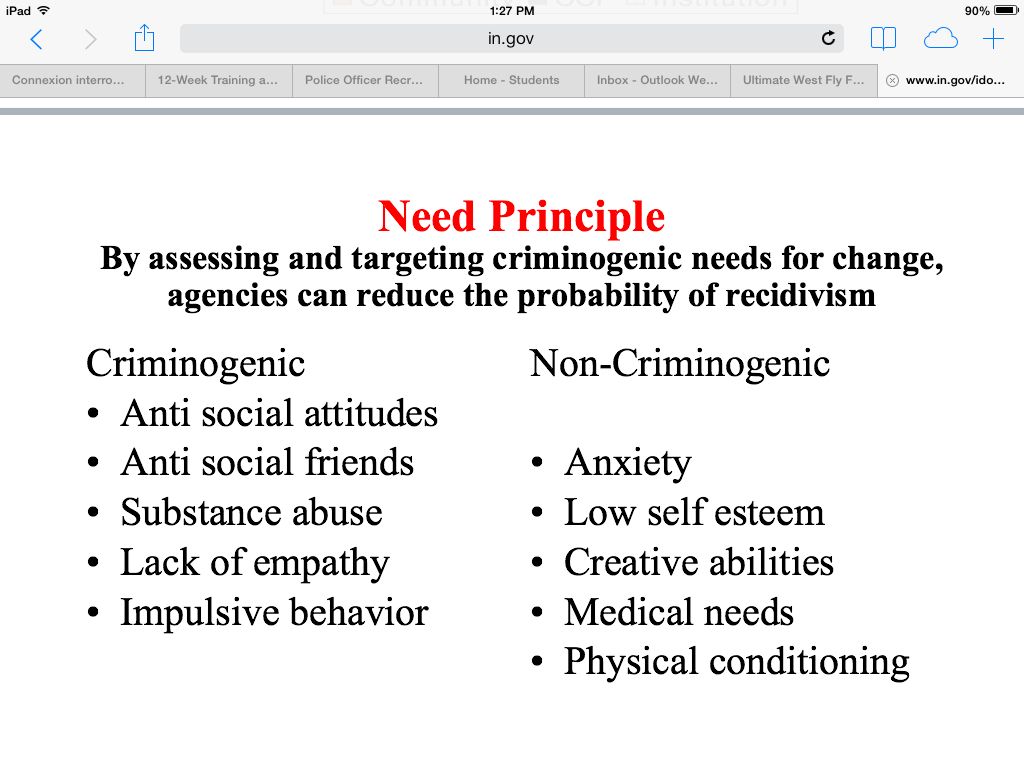
This is a follow-up to Recidivism and Statistics. I know better than to try to write a learned blog post on lowering recidivism. But, the chart above from the government of the State of Indiana will give you an idea of some of the needs to be addressed in order to lower recidivism. Missing is any mention of spirituality. This is a general lack in almost all government approaches, even though multiple studies, various not necessarily religious, have shown that spirituality is a strong part of people’s lives.
I am not going on a rant about how Jesus has been kept out of the jails. He has not been, all prisons have at least one Christian chaplain available for the inmates. But, the misunderstanding of the concept of spirituality has tended to make the chaplain seen as merely a functionary who meets First Amendment requirements and is useful for family communications, etc. For instance, most chaplains are the people in a prison who are responsible for notifying the inmate of the death of a family member.
So, what is a non-denominational definition of spirituality? Dr. Maya Spencer writes, “Spirituality involves the recognition of a feeling or sense or belief that there is something greater than myself, something more to being human than sensory experience, and that the greater whole of which we are part is cosmic or divine in nature.” That feeling, sense, or belief should be addressed. For example, through PTSD-affected people, there are studies that now begin to show that the failure to address spirituality can lead to a lowered prospect of a healthful recovery. Moral Injury Theory has developed to reasonably demonstrate that many who are affected by PTSD have an internalized sense that they have suffered an injury that is not merely physical or psychological, but rather spiritual.
Obviously, as an Orthodox Christian, I am convinced that true spirituality is found in union with God. Given the PTSD and Moral Injury studies, I am also convinced that these studies will transfer to the inmate population. Most of them come from dysfunctional families and have experiences that could best be classified as some type of Moral Injury. That is, it is not enough to say that they had a bad childhood background and they need to get over it. As Christians, we need to recognize that many of these folks have a spiritual injury that cannot be resolved by simply saying, “accept Jesus as your Lord and Savior.” [Note: for my non-Christian friends that read my blog, yes, I know that there are other faith groups, such as Islam, Judaism, etc., however, this post is addressed to Christians.]
The reason why I think that the injury cannot be simply resolved by a prayer to accept Jesus is found in the Gospels themselves. Think of how many times Jesus spent time talking to someone and asking them questions. Think of the woman at the well. I am certain that we are reading an abridged conversation and that Jesus spoke to her showing that he fully understood her background and her felt needs. Think of the man by the pool of Bethesda with whom Jesus spoke for a while before healing him. Those who have suffered Moral Injury, to include inmates, often need time to talk matters out and are not ready or willing to make an instant commitment.
Remember that many who have suffered Moral Injury may have deep questions about God. Where were you? Giving that injured person a sappy poster about how Jesus was with them all the time will not answer their heart pain. They need time to process and time to consider before they are ready to believe that God is with them. Frankly, it is not surprising that those who do not have that felt spiritual need answered would be among the group with recidivism issues.
So, what is the answer? Well, ministries like Prison Fellowship are trying to provide practical answers. Other groups are as well. But, frankly, we need to do much more, including research as well as prayer, volunteers to go to the prison, etc. No, this is not a great answer, but I am starting to learn and I hope to be part of the answer in the future.



Leave a Reply